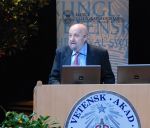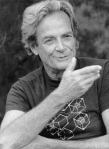Giovanni Jona-Lasinio is one of the greatest Italian physicists and it is well-known for his contributions to quantum field theory and statistical physics. He belongs to the School of Rome that yielded three Boltzmann medallists: himself, Giorgio Parisi and Giovanni Gallavotti. His model, postulated together with Yoichiro Nambu, represents the right behaviour of quantum chromodynamics at very low energies and put the basis for the future understanding of broken symmetries in particle physics. Indeed, Jona-Lasinio took the Nobel medal  on behalf of Nambu and presented also the lecture. Nambu could not go to Stockholm and so, the award passed by the hands of Jona-Lasinio. That year two Italian names were associated to that prize, the other one was Nicola Cabibbo. Jona-Lasinio has been one of my professors during my graduation course at University La Sapienza, together with Luciano Maiani and Nicola Cabibbo. I have got the best instruction and, of course, gaps are all mine. The School of Rome has been one of the main engines toward the complete realization of the Standard Model of particle physics as testified by the people I have just named. Then, most of these persons moved to statistical mechanics realizing great findings in this area and Jona-Lasinio was one of them. Sometime, he expressed some criticisms to particle physics as is practised today and in the last decades. This view is absolutely shareable and recently he presented it again in an interview to Asimmetrie (in Italian), the journal of Istituto Nazionale di Fisica Nucleare on 17 January 2014. You can find the full interview here. The interview was in Italian but the part numbered as 11 yields the critical view. I give here a translation:
on behalf of Nambu and presented also the lecture. Nambu could not go to Stockholm and so, the award passed by the hands of Jona-Lasinio. That year two Italian names were associated to that prize, the other one was Nicola Cabibbo. Jona-Lasinio has been one of my professors during my graduation course at University La Sapienza, together with Luciano Maiani and Nicola Cabibbo. I have got the best instruction and, of course, gaps are all mine. The School of Rome has been one of the main engines toward the complete realization of the Standard Model of particle physics as testified by the people I have just named. Then, most of these persons moved to statistical mechanics realizing great findings in this area and Jona-Lasinio was one of them. Sometime, he expressed some criticisms to particle physics as is practised today and in the last decades. This view is absolutely shareable and recently he presented it again in an interview to Asimmetrie (in Italian), the journal of Istituto Nazionale di Fisica Nucleare on 17 January 2014. You can find the full interview here. The interview was in Italian but the part numbered as 11 yields the critical view. I give here a translation:
I see… Also young people… Now there is not a position for everybody, especially in Italy, it is become hyper-competitive and so, this is a sociological fact, a lot of works come out, for young people is important to publish a lot, a lot of works come out that differ each other, I say, by an epsilon, and so we say the level is lowered a lot of… of… It is exactly the contrary of what was happening then because then to not publish was considered a virtue and maybe to have more interests. Now, there is hyper-specialization instead. So, where physics goes I do not know. Particle physics that was always considered fundamental physics even if indeed, in the second half of ‘900, the most important progresses were in statistical mechanics and condensed matter rather than particle physics, and biology. But indeed now with the experiments, I do not believe that after the LHC other accelerators will be made. Then, one recurs to cosmology also to have information on particles, so this is indirect knowledge. Where it will end particle physics I do not know because there is this aura, that I consider artificially kept yet, because it uses a huge quantity of money and so there is the need to present itself with a façade always of big… so futuristic, but I have no idea where it will go.
It is a fact that particle physics has not seen a great revolution since the end of seventies of the last century and LHC is yet there to check that somewhat old physics. Standard Model developed on sixties and seventies of the last century and we can date back the Higgs mechanism to 1964, very few years after Nambu and Jona-Lasinio proposal. Supersymmetry, if will be ever seen, is old as eighties of last century. After this, we have lived our latest thirty years with metaphysics without any sound foundation from experiments. Rather speculations.  Some of these ideas become so strong to convince people that these are the truth with bad consequences for all the community. This is now a recurring attitude for physicists. In other periods, most of the papers that today appear as great advances would be considered rubbish as now we use to accept shaky foundations for brave proposals.
Some of these ideas become so strong to convince people that these are the truth with bad consequences for all the community. This is now a recurring attitude for physicists. In other periods, most of the papers that today appear as great advances would be considered rubbish as now we use to accept shaky foundations for brave proposals.
Let me conclude with the concluding remarks by Richard Feynman at Caltech on 1974:
So I have just one wish for you–the good luck to be somewhere where you are free to maintain the kind of integrity I have described, and where you do not feel forced by a need to maintain your position in the organization, or financial support, or so on, to lose your integrity. May you have that freedom.


Particle physics may be mature, but it does seem that there is considerable legitimate basic science left to be done in QCD that is within the realm of possible experiments – for example – scalar and axial vector resonances that are not adequately explained, glueballs and other exotic hadrons to be identified or ruled out, parton distribution functions to be generalized from first principles, complex atomic nuclei to be explained from first principles, etc. And, of course, there is simply the issue of developing greater precision in QCD calculations and constants which lags horribly behind the precision found in electroweak phenomena. We may glimpse the end of the tunnel, but we are certainly not there yet.
Do you think that lepton universality will hold in the end? Or are the experimental hints of violations of it bona fide evidence of “new physics”?
Dear ohwilleke,
Thanks for your comment. I am somewhat a fan of QCD and I am working on it yet. What made me surprised is that, once researchers discovered it and saw that it was unsolvable, nobody cared too much. After 40 years we are here yet to cope with this matter. It is not a simple matter as people at CERN has to evaluate the background and a deep knowledge of QCD is essential. Looking in the literature you will realize that also at high energies, where perturbation theory applies, there are serious difficulties to treat this theory. So, QCD has all the chrisms of a problem promising a scientific revolution. Anyhow, it is a Cinderella with respect to other proposals that, without a single experimental evidence, seem to show greater appeal. This dyscrasia is at the basis of the difficulties we meet today in particle physics and is also the reason why a number of eminent physicists like Jona-Lasinio or Parisi preferred a different area for research. We are left with a kind of metaphysics and the discussions are similar to those of Scholasticism of the Middle Age where the number of angels on the head of a pin was a concern. It is difficult to reach an agreement here. Somebody has proposed to remove the strict constraints of the scientific method to accept the “fact” that multiverse is indeed a reality.
About the experiments the situation is somewhat different and my hope is to see at LHC some evidence that will permit us to left all the bad behind and starting again for the good. It is just a matter of days and we will see.
Off topic: Nambu died. Though you should know.
http://www.kyodonews.net/news/2015/07/17/24888
Dear ohwilleke,
Thanks a lot for pointing this out. Yes, I was aware of this bad news as there has been a flooding in all the social networks about and an obituary by the New York Times. It is a severe loss for physics but his legacy will survive him forever.
Marco